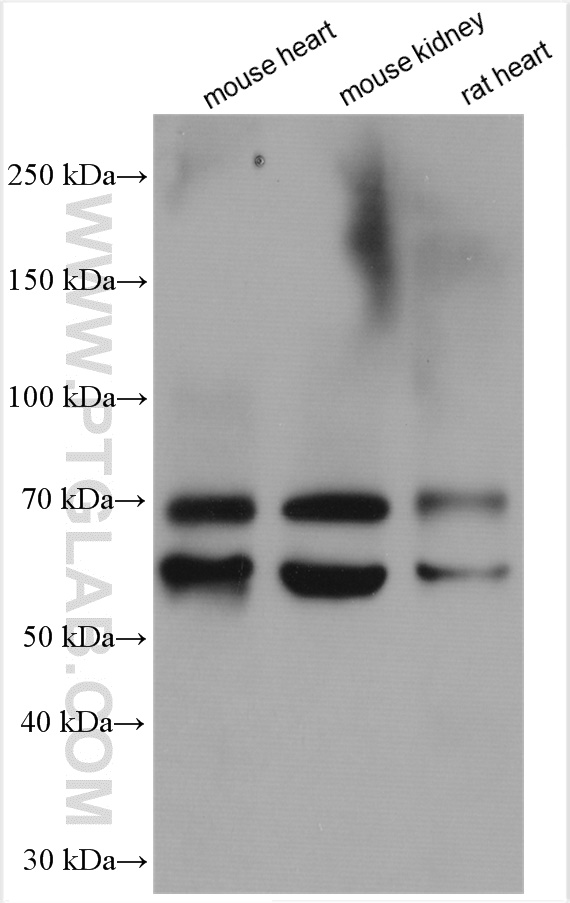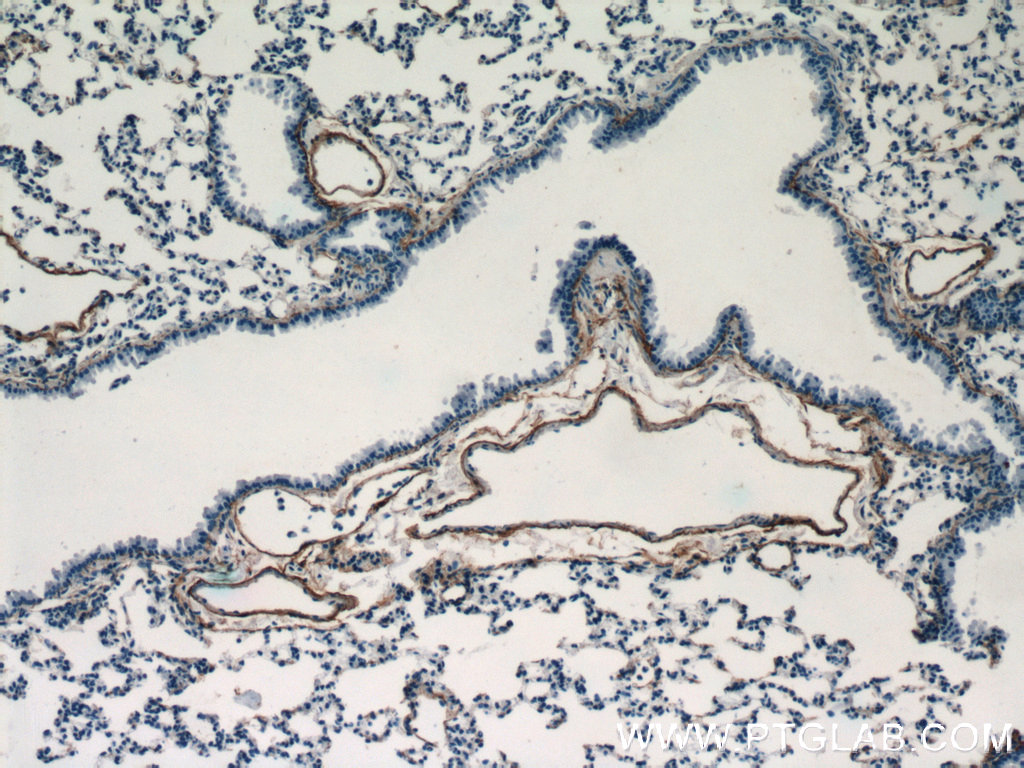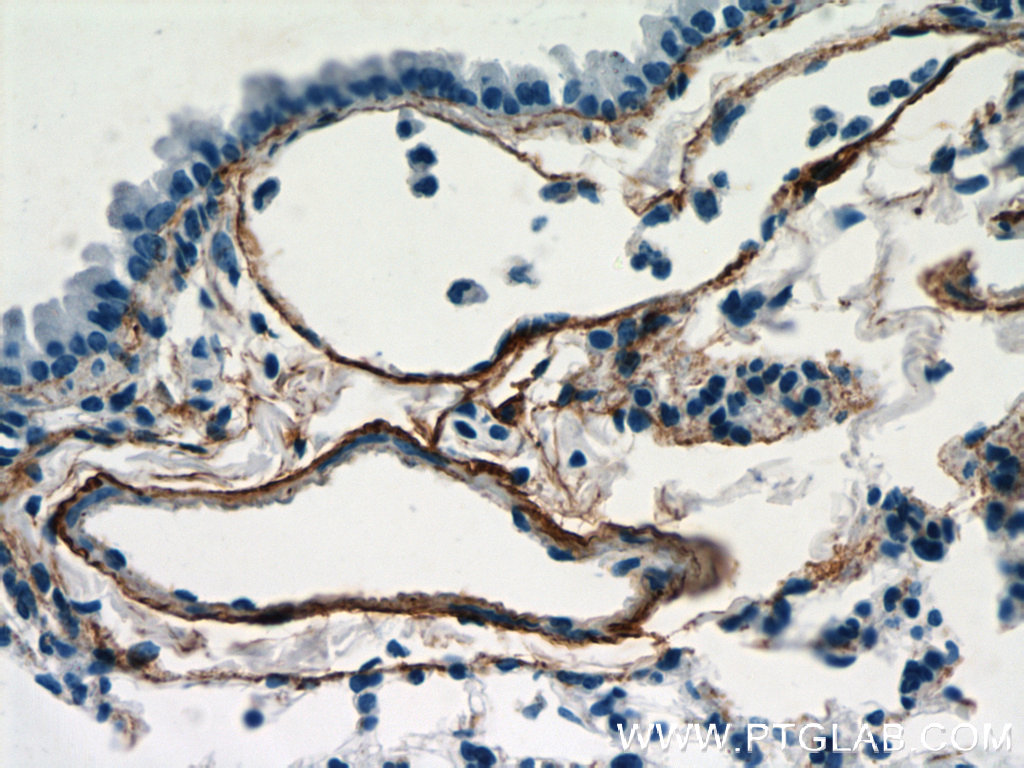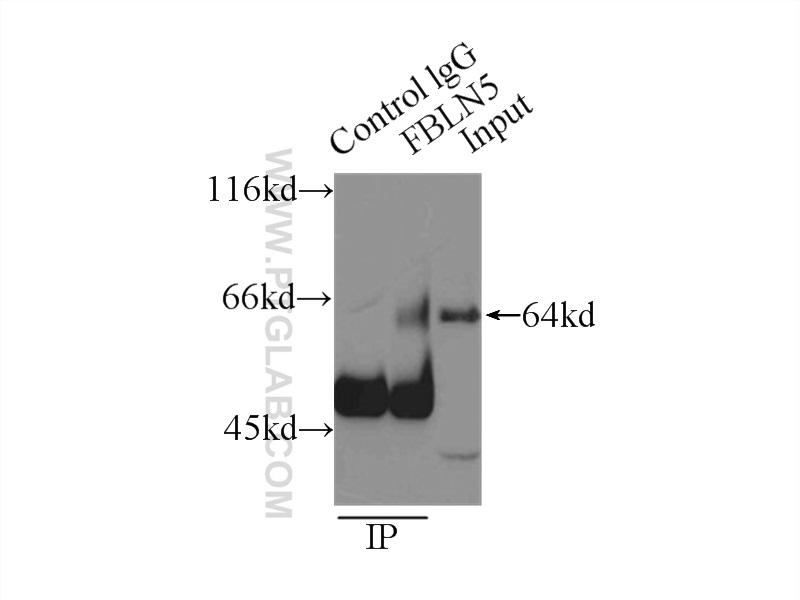验证数据展示
经过测试的应用
| Positive WB detected in | mouse heart tissue, rat brain tissue, mouse placenta tissue, mouse skeletal muscle tissue, mouse kidney tissue, rat heart tissue |
| Positive IP detected in | mouse heart tissue |
| Positive IHC detected in | mouse lung tissue, human heart tissue, human pancreas tissue Note: suggested antigen retrieval with TE buffer pH 9.0; (*) Alternatively, antigen retrieval may be performed with citrate buffer pH 6.0 |
推荐稀释比
| 应用 | 推荐稀释比 |
|---|---|
| Western Blot (WB) | WB : 1:1000-1:8000 |
| Immunoprecipitation (IP) | IP : 0.5-4.0 ug for 1.0-3.0 mg of total protein lysate |
| Immunohistochemistry (IHC) | IHC : 1:50-1:500 |
| It is recommended that this reagent should be titrated in each testing system to obtain optimal results. | |
| Sample-dependent, Check data in validation data gallery. | |
产品信息
12188-1-AP targets Fibulin 5 in WB, IHC, IF, IP, ELISA applications and shows reactivity with human, mouse, rat samples.
| 经测试应用 | WB, IP, IHC, ELISA Application Description |
| 文献引用应用 | WB, IHC, IF |
| 经测试反应性 | human, mouse, rat |
| 文献引用反应性 | human, mouse |
| 免疫原 | Fibulin 5 fusion protein Ag2859 种属同源性预测 |
| 宿主/亚型 | Rabbit / IgG |
| 抗体类别 | Polyclonal |
| 产品类型 | Antibody |
| 全称 | fibulin 5 |
| 别名 | ARMD3, DANCE, EVEC, FBLN5, FIBL 5, fibulin 5, UP50, Urine p50 protein |
| 计算分子量 | 448 aa, 50 kDa |
| 观测分子量 | 55 kDa, 65 kDa |
| GenBank蛋白编号 | BC022280 |
| 基因名称 | Fibulin 5 |
| Gene ID (NCBI) | 10516 |
| RRID | AB_2105939 |
| 偶联类型 | Unconjugated |
| 形式 | Liquid |
| 纯化方式 | Antigen affinity purification |
| UNIPROT ID | Q9UBX5 |
| 储存缓冲液 | PBS with 0.02% sodium azide and 50% glycerol , pH 7.3 |
| 储存条件 | Store at -20°C. Stable for one year after shipment. Aliquoting is unnecessary for -20oC storage. |
背景介绍
Fibulin-5, also known as EVEC and DANCE, is a extracellular matrix glycoprotein, secreted by various cell types such as vascular smooth muscle cells, fibroblasts and endothelial cells. Structurally, Fibulin-5 contains an Arg-Gly-Asp (RGD) motif and calcium-binding EGF-like domains. It promotes adhesion of endothelial cells through interaction of integrins and the RGD motif. FBLN5 mutations have been described in patients with age-related macular degeneration, as well as being involved in Charcot-Marie-Tooth neuropathies. This antibody got 50 kDa or 66 kDa band in western blotting, the 66 kDa corresponding to fully glycosylated protein.
实验方案
| Product Specific Protocols | |
|---|---|
| WB protocol for Fibulin 5 antibody 12188-1-AP | Download protocol |
| IHC protocol for Fibulin 5 antibody 12188-1-AP | Download protocol |
| IP protocol for Fibulin 5 antibody 12188-1-AP | Download protocol |
| Standard Protocols | |
|---|---|
| Click here to view our Standard Protocols |
发表文章
| Species | Application | Title |
|---|---|---|
Arterioscler Thromb Vasc Biol Increased aortic stiffness and attenuated lysyl oxidase activity in obesity. | ||
Biochem J Fibulin-5 binds urokinase-type plasminogen activator and mediates urokinase-stimulated β1-integrin-dependent cell migration. | ||
Cell Tissue Res Aberrant elastin remodeling in the lungs of O2-exposed newborn mice; primarily results from perturbed interaction between integrins and elastin. | ||
Am J Physiol Cell Physiol Caveolin-1 stabilizes ATP7A, Cu transporter for Extracellular SOD, in Vascular Tissue to Maintain Endothelial Function. | ||
Clin Exp Pharmacol Physiol Limb remote ischemic postconditioning-induced elevation of fibulin-5 confers neuroprotection to rats with cerebral ischemia/reperfusion injury: activation of the AKT pathway.
| ||
JID Innov Fibulin-4 Accelerates Amyloid Formation by Binding with a Keratin 5 Peptide Fragment. |












